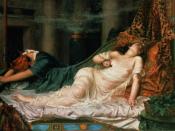Tragic heroine or 'triple- turned whore'?
Examine Shakespeare's dramatic presentation of Cleopatra in response to these descriptions. How do you respond to his portrayal of her as a character?
Before Shakespeare wrote his portrayal of Cleopatra queen of the Nile, Plutarch wrote a similar version of the story. Where Shakespeare's play focuses on the life of both Antony and Cleopatra, Plutarch's version was focussed completely on Antony, even the title differs. Where Shakespeare called his version 'Antony and Cleopatra', Plutarch named his version 'The life of Marcus Antonius'. Aided by this, Shakespeare was able to then create Cleopatra as a whole new character because Plutarch speaks of her very little as an influential character in the play and defines her. This is why Cleopatra's character is much like the ones in Shakespeare's other plays, in that he lets them express their opinions, yet doesn't seem to make them equal or more powerful than the male characters.
Different critics have described Cleopatra's character in many different ways; some take the view that she was a tragic heroine and others that she is a 'triple-turned whore'.
If we are to refer to her as a tragic heroine, as I will discuss in more detail later, this means she was heroic in her death and she died for the right reasons. The title of Tragic Heroine is given to a person of high importance who has a flaw that leads to their downfall and eventually dies a heroic and noble death. However, other critics view the character of Cleopatra in quite the opposite way. She is referred to in the play as a 'triple-turned whore'; I will also going to discuss this line of argument later. What is possibly meant by this phrase is that Cleopatra was cowardly in her...


